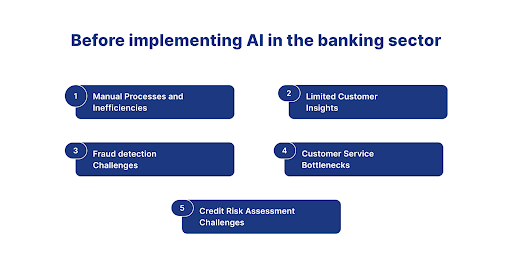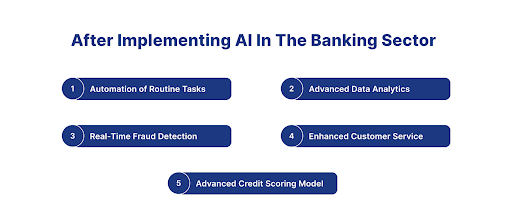AI In the Banking Sector: 5 Ways To Implement AI To Transform The Banking Sector
Applying AI In the Banking Sector necessitates thoroughly comprehending the particular opportunities and difficulties the sector faces.
Introduction

- The banking business is very competitive, always searching for new and creative methods to improve client experiences and optimize workflows. Artificial intelligence (AI) has been a disruptive force in the financial sector in recent years, bringing new methods for process automation, enhanced decision-making, and customer-specific services. However, applying AI In the Banking Sector necessitates thoroughly comprehending the particular opportunities and difficulties the sector faces. In this article, we'll look at how banks may use AI to streamline processes and give clients better service.
Before implementing AI in the banking sector

1.Manual Processes and Inefficiencies
- Data entry, document management, and customer service were examples of labor-intensive, error-prone manual tasks in the conventional banking era before using AI. Rigid procedures and outdated systems hampered adaptability to changes in the market. In the banking industry, AI was intended to improve responsiveness, decrease mistakes, and streamline processes.
2.Limited Customer Insights
- Before integrating AI into the banking sector, data analysis was constrained by manual processes and inefficiencies. Traditional systems struggled to extract timely and meaningful insights from vast datasets, hindering strategic decision-making. The lack of agile analytics impeded the development of personalized services and a deeper understanding of customer needs. With the advent of AI, banks now leverage advanced analytics tools, enabling real-time insights and fostering more agile, data-driven decision-making processes.
3.Fraud detection challenges
- Fraud detection was difficult until artificial intelligence (AI) was included in banking. Conventional systems were reactive, dealing with fraud after instances happened and requiring advanced real-time pattern recognition. Time-consuming manual review procedures made it difficult to identify fraudulent activity quickly, and the lack of sophisticated technology reduced the efficacy of preventative measures.
4.Customer Service Bottlenecks
- Customer service had obstacles before AI In the Banking Sector. High quantities of questions caused delays and annoyance for customers in traditional systems. The ability of human agents to offer prompt, individualized support was constrained. Artificial Intelligence, particularly chatbots and virtual assistants, has greatly decreased these bottlenecks. Artificial intelligence (AI) driven systems improve customer satisfaction by handling routine questions, making personalized suggestions, and responding instantly.
5.Credit Risk Assessment Challenges
- Credit risk assessment had difficulties using antiquated techniques before AI In the Banking Sector. A cautious strategy based on historical data and small factors prevented loans from being extended to worthy people, hence impending financial inclusion. Conventional models found adjusting challenging, resulting in partial assessments and limited development for institutions and borrowers. This method made it difficult to create a lending environment that is more responsive and inclusive.
After implementing AI in the banking sector

1.Automation of Routine Tasks
- Integrating AI In the Banking Sector has completely changed this environment through robotic process automation and machine learning. This change dramatically improves accuracy, lowers expenses, and frees up personnel for other strategic projects while maintaining the dependability and efficiency of banking operations.
2.Advanced Data Analytics
- AI has enabled sophisticated algorithms to analyze enormous datasets and provide real-time insights quickly. This allows banks to recognize new trends, comprehend consumer behavior, and make proactive decisions—all of which help them become more agile and competitive in the financial sector.
3.Real-time Fraud Detection
- This was revolutionized by AI integration, which made real-time monitoring possible. These days, AI systems instantaneously examine transaction patterns to spot potential fraud before it happens. By taking a proactive stance, banks may improve security, lower fraud's financial and reputational risks, and successfully fend off prospective threats.
4.Enhanced Customer Service
- Chatbots and virtual assistants driven by AI have changed this environment. These days, they respond quickly, deal with regular questions, and make tailored suggestions depending on the client's preferences. This guarantees speedier issue resolution and improves client happiness, engagement, and loyalty in the ever-changing financial industry.
5.Advanced credit scoring model
- This approach is now revolutionized by AI-powered models incorporating a more comprehensive range of data sources, including unconventional elements like internet behavior. A complete policy may accurately assess credit risk, leading to greater financial inclusion and a dynamic lending environment that meets various financial demands.
Conclusion
- In conclusion, by increasing operational effectiveness, improving client experiences, and increasing profitability, the application of AI in the banking sector has the potential to transform the industry completely. Artificial Intelligence (AI) gives banks several options to deliver more individualized and effective services to their clients, ranging from chatbots and personalized suggestions to fraud detection algorithms.
How Digiqt will help you adapt AI in your company
-
At Digiqt, we are dedicated to assisting companies in automating critical processes. Our highly skilled and professional team ensures the timely development and delivery of AI software. We commence by thoroughly understanding our client's specific requirements, and based on these requirements, our proficient team develops the AI software. Furthermore, we provide our clients with monthly updates on the software development progress.
-
Digiqt's commitment to automation, client-centric software development, and regular updates ensures efficiency and effectiveness in streamlining insurance operations.
Contact Us
Frequently Asked Questions
What are AI In the Banking Sector?
AI In the Banking Sector are AI-powered systems that automate and optimize processes using machine learning, natural language processing, and intelligent decision-making capabilities.
How do AI In the Banking Sector work?
AI In the Banking Sector work by analyzing data, learning patterns, and executing tasks autonomously while integrating with existing systems to streamline operations and improve efficiency.
What are the benefits of using AI In the Banking Sector?
The benefits include increased efficiency, reduced operational costs, improved accuracy, 24/7 availability, better customer experience, and data-driven insights for decision-making.


















